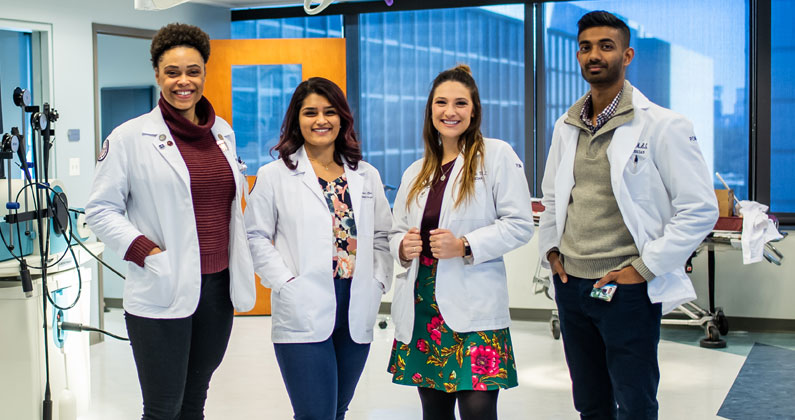Op-Ed: Medical Students Critical to COVID Vaccination Mobilization Effort
February 4, 2021 Health professional students may be important contributors to the nation's COVID-19
vaccination efforts.
Health professional students may be important contributors to the nation's COVID-19
vaccination efforts.
A version of this article originally appeared in The Philadelphia Citizen on February 2, 2021.
When the first effective COVID-19 vaccine was introduced last November – a monumental
feat in such a short timeframe – the challenge began of implementing a nationwide
mass-vaccination effort. Nearly three months in, the effort has so far been beset
by logistical delays, supply shortages, and a lack of clarity around eligibility,
among other issues. With herd immunity dependent on vaccinating a large majority of
the population (80-90%, by some estimates), supply and distribution will clearly need to accelerate, but so, too, will the
number of vaccine sites and volunteers trained to deliver those vaccines. Students
from health professional schools in the Philadelphia region, across disciplines –
medical, nursing, physician assistant, pharmacy, podiatry and dental – will be critical
to this effort and have a unique opportunity to be leaders in this historic mobilization.
Since the early days of the pandemic, Philadelphia College of Osteopathic Medicine (PCOM) students from all three of our campuses (PCOM, PCOM Georgia and PCOM South Georgia) have been volunteering in various capacities
to support their respective communities. From collecting and distributing PPE to staffing and volunteering at local testing sites, students have gained valuable
experience working alongside the medical professionals they will call their colleagues
after graduation. These efforts have not been limited to just PCOM students; in fact,
health profession students across the country have shown incredible poise and professionalism
in assisting efforts to combat this virus.
As additional vaccines have been approved, national efforts to assist in the rollout,
such as Students Assist America (SAA), organized by the American Association of Colleges of Osteopathic Medicine, have
positioned health profession students to be critical participants in a civilian mobilization
effort not seen in generations. We are at a crucial moment in this crisis where nothing
is more important than getting as many people vaccinated as possible. The students
of PCOM and other area health professional schools can and should, under direct medical
supervision, play a critical role in scaling up our inoculation efforts to provide
a vaccine to all who want one.
It is incumbent upon us as medical professionals to utilize the skills and training
we have developed to help push us through this challenging period in our history.
To be sure, the COVID-19 vaccine provides a renewed sense of hope that this crisis
will soon be behind us, but now is the time to prepare for the road ahead. Health profession students are uniquely positioned in this moment to contribute to the nationwide vaccination
effort while simultaneously gaining the hands-on experience they will bring as medical
providers in their communities.
As a physician, I am incredibly proud of the progress my colleagues on the frontlines have made and continue to make. As a person, I am humbled by the humanity and grace
they have shown under the strain of this tremendous pressure. With the support of
the budding medical professionals trained at PCOM and other area health professional
schools, I am confident that, together, we will see our way through this.
Jay S. Feldstein, DO ‘81, is President and CEO of Philadelphia College of Osteopathic Medicine, overseeing
business and affairs of the College and its three locations.
About Philadelphia College of Osteopathic Medicine
Established in 1899, Philadelphia College of Osteopathic Medicine (PCOM) has trained
thousands of highly competent, caring physicians, health practitioners and behavioral
scientists who practice a “whole person” approach to care—treating people, not just
symptoms. PCOM, a private, not-for-profit accredited institution of higher education,
operates three campuses (PCOM, PCOM Georgia and PCOM South Georgia) and offers doctoral degrees in clinical psychology, educational psychology, osteopathic
medicine, pharmacy, physical therapy, and school psychology. The college also offers
graduate degrees in applied behavior analysis, applied positive psychology, biomedical
sciences, forensic medicine, medical laboratory science, mental health counseling,
physician assistant studies, and school psychology. PCOM students learn the importance
of health promotion, research, education and service to the community. Through its
community-based Healthcare Centers, PCOM provides care to medically underserved populations.
For more information, visit pcom.edu or call 215-871-6100.
Contact Us
For general media inquiries, please contact the Office of Marketing and Communications
at 215-871-6300 or communications@pcom.edu. Visit our media relations page to view contact information for public relations personnel.
Connect with PCOM

 Health professional students may be important contributors to the nation's COVID-19
vaccination efforts.
Health professional students may be important contributors to the nation's COVID-19
vaccination efforts.